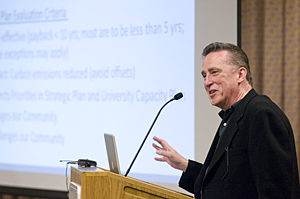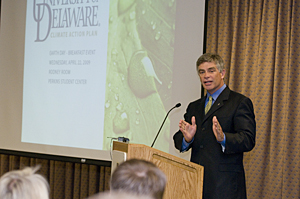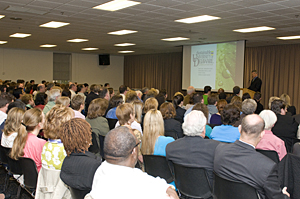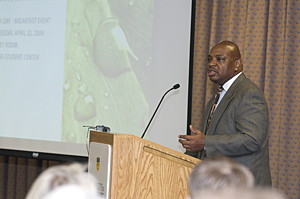
- Rozovsky wins prestigious NSF Early Career Award
- UD students meet alumni, experience 'closing bell' at NYSE
- Newark Police seek assistance in identifying suspects in robbery
- Rivlin says bipartisan budget action, stronger budget rules key to reversing debt
- Stink bugs shouldn't pose problem until late summer
- Gao to honor Placido Domingo in Washington performance
- Adopt-A-Highway project keeps Lewes road clean
- WVUD's Radiothon fundraiser runs April 1-10
- W.D. Snodgrass Symposium to honor Pulitzer winner
- New guide helps cancer patients manage symptoms
- UD in the News, March 25, 2011
- For the Record, March 25, 2011
- Public opinion expert discusses world views of U.S. in Global Agenda series
- Congressional delegation, dean laud Center for Community Research and Service program
- Center for Political Communication sets symposium on politics, entertainment
- Students work to raise funds, awareness of domestic violence
- Equestrian team wins regional championship in Western riding
- Markell, Harker stress importance of agriculture to Delaware's economy
- Carol A. Ammon MBA Case Competition winners announced
- Prof presents blood-clotting studies at Gordon Research Conference
- Sexual Assault Awareness Month events, programs announced
- Stay connected with Sea Grant, CEOE e-newsletter
- A message to UD regarding the tragedy in Japan
- More News >>
- March 31-May 14: REP stages Neil Simon's 'The Good Doctor'
- April 2: Newark plans annual 'wine and dine'
- April 5: Expert perspective on U.S. health care
- April 5: Comedian Ace Guillen to visit Scrounge
- April 6, May 4: School of Nursing sponsors research lecture series
- April 6-May 4: Confucius Institute presents Chinese Film Series on Wednesdays
- April 6: IPCC's Pachauri to discuss sustainable development in DENIN Dialogue Series
- April 7: 'WVUDstock' radiothon concert announced
- April 8: English Language Institute presents 'Arts in Translation'
- April 9: Green and Healthy Living Expo planned at The Bob
- April 9: Center for Political Communication to host Onion editor
- April 10: Alumni Easter Egg-stravaganza planned
- April 11: CDS session to focus on visual assistive technologies
- April 12: T.J. Stiles to speak at UDLA annual dinner
- April 15, 16: Annual UD push lawnmower tune-up scheduled
- April 15, 16: Master Players series presents iMusic 4, China Magpie
- April 15, 16: Delaware Symphony, UD chorus to perform Mahler work
- April 18: Former NFL Coach Bill Cowher featured in UD Speaks
- April 21-24: Sesame Street Live brings Elmo and friends to The Bob
- April 30: Save the date for Ag Day 2011 at UD
- April 30: Symposium to consider 'Frontiers at the Chemistry-Biology Interface'
- April 30-May 1: Relay for Life set at Delaware Field House
- May 4: Delaware Membrane Protein Symposium announced
- May 5: Northwestern University's Leon Keer to deliver Kerr lecture
- May 7: Women's volleyball team to host second annual Spring Fling
- Through May 3: SPPA announces speakers for 10th annual lecture series
- Through May 4: Global Agenda sees U.S. through others' eyes; World Bank president to speak
- Through May 4: 'Research on Race, Ethnicity, Culture' topic of series
- Through May 9: Black American Studies announces lecture series
- Through May 11: 'Challenges in Jewish Culture' lecture series announced
- Through May 11: Area Studies research featured in speaker series
- Through June 5: 'Andy Warhol: Behind the Camera' on view in Old College Gallery
- Through July 15: 'Bodyscapes' on view at Mechanical Hall Gallery
- More What's Happening >>
- UD calendar >>
- Middle States evaluation team on campus April 5
- Phipps named HR Liaison of the Quarter
- Senior wins iPad for participating in assessment study
- April 19: Procurement Services schedules information sessions
- UD Bookstore announces spring break hours
- HealthyU Wellness Program encourages employees to 'Step into Spring'
- April 8-29: Faculty roundtable series considers student engagement
- GRE is changing; learn more at April 15 info session
- April 30: UD Evening with Blue Rocks set for employees
- Morris Library to be open 24/7 during final exams
- More Campus FYI >>
4:45 p.m., April 22, 2009----The University of Delaware will reduce its carbon emissions -- virtually all of which come from the energy used in campus buildings and for transportation -- 20 percent by 2020, President Patrick Harker announced at a special Earth Day program Wednesday.
In announcing the University's Climate Action Plan, Harker also set interim targets for carbon emissions, including reductions of 5 percent by 2012 and 10 percent by 2015, compared with the 2008 levels that were measured in a comprehensive carbon inventory of the campus.
He told a capacity crowd in the Rodney Room of the Perkins Student Center that the benchmarks will be met by focusing on four areas: green infrastructure, primarily the University's 350 buildings that are the source of 77 percent of campus carbon emissions; green energy, with 10 percent of UD's energy use in 2020 coming from such clean sources as solar power; sustainable transportation based on the development of a master plan that will emphasize improvements to bus and other transit systems; and green community action, which Harker called “the most essential part” of the action plan.
“I've never seen the community more mobilized,” John Byrne, director of UD's Center for Energy and Environmental Policy and a member of the International Panel on Climate Change that won the 2007 Nobel Peace Prize, said at the event, adding that the commitment to a 20 percent emissions reduction by 2020 will put UD's efforts ahead of any other college or university. “This is the most aggressive plan in the United States. You can be proud of your University.”
Byrne reported some of the most recent scientific findings about climate change, including the loss of sea ice -- 20 percent by area and 40 percent by volume, he noted -- and said that the recently rapid rate of melting ice is most alarming.
“We need to take action now,” Byrne said. “We do not have much longer.”
To address climate change, scientists have calculated that each person on Earth should emit no more than 3.3 tons of carbon per year, he said. Currently, the U.S. emits about 21 tons per person, Europe about 16 tons, Japan about 12 and China about 4. “The U.S. is the most carbon-intensive nation in history,” Byrne said. “There's no doubt who needs to take action.”
Harker said the University's efforts leading up to the creation of the Climate Action Plan began last spring, when the Path to ProminenceTM strategic plan included a goal of becoming a leader in environmental education, research, technology and policy. “Of course,” he said, “that entailed leading by example-that is, becoming a carbon-neutral, green university.”
Also last year, Harker signed the American College and University Presidents' Climate Commitment, pledging to pursue carbon neutrality, reduce greenhouse gas emissions and publicly report on UD's environmental efforts and progress toward its goals. Another key step, he said, came when the Class of 2008 voted to use its class gift to fund the first-ever study of the campus's carbon footprint. The Class of 2009 recently voted to use its class gift to pay for solar panels on campus. For more information, visit this Web site.
Harker praised the hard work of those who contributed to the carbon inventory project and the new action plan, as well as to the hundreds of UD community members who attended meetings and made suggestions.
“This campus-wide engagement in the plan - generating a sense of community around it -- is absolutely essential, because we cannot realize a carbon-neutral future without the commitment and buy-in of everyone at the University,” he said.
“I do think this University is particularly fortunate to have a number of people on campus who are passionately dedicated to this cause, who are environmentally responsible themselves and who demand the same from the University.” Faculty and staff, as well as alumni, will have the opportunity to help support environmental initiatives on campus through the creation of the UD Sustainability Fund, he said.
Also speaking at the announcement were Collin O'Mara, the new secretary of the Delaware Department of Natural Resources and Environmental Control; William Early, acting regional administrator for the federal Environmental Protection Agency; and, via video, U.S. Sen. Ted Kaufman of Delaware.
“The world is facing the first truly global environmental crisis,” Kaufman said, calling for immediate action to address climate change. “It is great to see the University of Delaware leading the way.”
O'Mara said one of the reasons he left San Jose, Calif., for Delaware was because of the University and its national reputation in such areas as solar power research. In setting goals for carbon emissions, a global target is an 80 percent reduction by 2050, he said, “but America is going to have to do more than that” and play a leadership role.
Early called the 39th annual Earth Day “a historic day” and praised the University's action plan. “The University of Delaware has taken a significant step today,” he said. “Your commitment is a testament that these real-world reductions can take place.”
For more information about the University's environmental initiatives, visit this Web site.
Wednesday's event began with a “no-waste breakfast” after which all the food waste was composted at UD's Webb Farm through a collaboration between Facilities and the College of Agriculture and Natural Resources. Dining Services used reusable dishes to eliminate waste, and beverages were served from pitchers to eliminate plastic bottle waste.
Contest winners announced
Also Wednesday, winners of the University's contest, “What Does Sustainability Mean to You?” were announced. Participants entered either an original video or a T-shirt logo, with prizes including tickets to Philadelphia Phillies and Wilmington Blue Rocks games.
Winners in the video contest were: first place, postdoctoral researcher Joseph Zeni Jr.; second place, student Andrew David Lynch; and third place, student Benjamin David Roewer.
Winners in the logo competition were: first place, student Aaron Scott Hallett for “Pillars of Success”; second place, student Maeva Tureau for “Make the Right Choice”; and third place, student Prabhavathi Srinivasan for “Wind Power.”
For more about the contest and the winners, visit this Web site.
Article by Ann Manser
Photos by Kathy F. Atkinson





